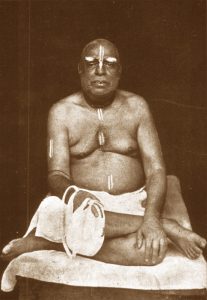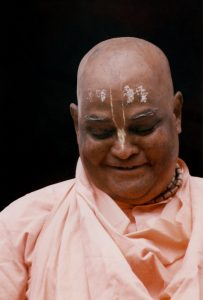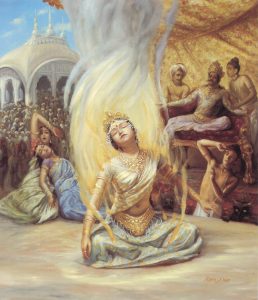[ad_1]

The following is an excerpt of an article by Śrīla Saccidānanda Bhaktivinoda Ṭhākura, published in Rays of The Harmonist, No. 26, Āṣāḍhī Amāvasyā, 2014 (Purebhakti.com)
Having thus been forewarned about vaiṣṇava-nindā, it is absolutely imperative first to ascertain what specifically  designates one a Vaiṣṇava, and then determine which acts result in vaiṣṇava-aparādha (offences to Vaiṣṇavas). All jīvas fit into one of four categories: (1) ordinary jīvas; (2) religious jīvas; (3) brāhmaṇas and those jīvas who resemble Vaiṣṇavas (vaiṣṇavaprāya jīvas); and (4) vaiṣṇava-jīvas.
designates one a Vaiṣṇava, and then determine which acts result in vaiṣṇava-aparādha (offences to Vaiṣṇavas). All jīvas fit into one of four categories: (1) ordinary jīvas; (2) religious jīvas; (3) brāhmaṇas and those jīvas who resemble Vaiṣṇavas (vaiṣṇavaprāya jīvas); and (4) vaiṣṇava-jīvas.
With the wisdom that Śrī Kṛṣṇa resides in the heart of all jīvas, one should honour every living being. A deeper respect should naturally be shown to the religious jīva, and, beyond this, it is imperative to feel even deeper honour for the brāhmaṇa-jīva and the vaiṣṇava-prāya jīva. But above all, it is enjoined that one must worship and serve the lotus feet of a vaiṣṇava-jīva.
If one fails to offer respect to the common jīva, special respect to the religious jīva, and befitting honour to the brāhmaṇa and vaiṣṇava-prāya jīvas, then one incurs sin (pāpa). However, to disrespect or dishonour a vaiṣṇava-jīva is actually an aparādha (an offence against divinity). There is no form of sin that cannot be destroyed by performing ordinary penances, but an aparādha committed against a Vaiṣṇava is not easily eradicated. Sins affect the gross and subtle material bodies, whereas an aparādha specifically affects the jīva’s quest to establish himself in his constitutional position as a pure spirit soul, causing him to fall from his path. Therefore, those who wish to perform loving worship of the Supreme Lord (bhagavad-bhajana) must diligently protect themselves from committing aparādha.

The following is an excerpt from a class on Caitanya Caritāmṛta Ādi-līlā 17.45 by Śrīla Gaura Govinda Svāmī Mahārāja in Bhubaneswar, India on 21 April 1995, published on gourgovindaswami-vanisanga.com/vanisanga
Devotee: I was hearing blasphemy of your divine grace. I was hearing ill of you and yet I still come and get  mercy from you. I still come and take shelter. How is this?
mercy from you. I still come and take shelter. How is this?
Śrīla Gaura Govinda Svāmī Mahārāja: It is said that if it is going on, don’t hear. Get out of that place.
Devotee: But I was hearing. I was hearing for a long time and then I came to you and…
Śrīla Gaura Govinda Svāmī Mahārāja: No more, no more! If someone criticizes then get out of there. It is said, if you have that capacity, cut off his tongue. If you don’t have that capacity, you cannot do it, then better leave that place as soon as you hear criticism. If you cannot leave that place then kill yourself. “Let me die so that no more hearing this.”
Devotee: I read that there is some śāstric evidence that those who want to kill themselves are the vaiśyas, those who want to cut off their tongue are the kṣatriyas, those who go away are the brāhmaṇas.
Śrīla Gaura Govinda Svāmī Mahārāja: Yes, those who go away are the brāhmaṇas. So it is better to leave that place, get out from there, not to hear. Because hearing such is also an offence.
Devotee: Guru Mahārāja, sometimes devotees have the idea that a way to mitigate that offence is to defeat such a person in debate or argument.…
Śrīla Gaura Govinda Svāmī Mahārāja: If you have that capacity, you have to cut off his tongue so he will not utter this anymore. If you cannot do that, better leave. You should not hear. If you hear then you will be an offender and lose all your piety. Your bhakti will be lost, everything will be lost.
Devotee: But if you are surrounded in society by people who are very happy to hear such offences, what will you do then?
Śrīla Gaura Govinda Svāmī Mahārāja: What does Bhaktivinoda Ṭhākura says “I rejoice when I hear all these things.”
Devotee: The wife of Lord Śiva committed suicide.
Śrīla Gaura Govinda Svāmī Mahārāja: Yes, she couldn’t leave the place because Dakṣa was her father, and she could not cut off his tongue. So she committed suicide.
Devotee: She could not argue with her father.
Śrīla Gaura Govinda Svāmī Mahārāja: No, she couldn’t argue with her father.
Devotee: Guru Mahārāja, you were saying that a mahātmā doesn’t see faults in anyone.
Śrīla Gaura Govinda Svāmī Mahārāja: Yes, a mahātmā tolerates. But the dust of the mahātmā cannot tolerate. Hari cannot tolerate it.
Devotee: Adoṣa-darśi, not seeing any faults.
Śrīla Gaura Govinda Svāmī Mahārāja: A mahātmā never sees the faults, he tolerates. Yes.
Mādhavānanda dāsa: It is a difficult thing to understand because so many faults may be there, but how is it that a mahātmā doesn’t see them?
Śrīla Gaura Govinda Svāmī Mahārāja: Because he is such an elevated person. He sees only good things, and never sees anything bad.
Devotee: So the bad things may be there but he just overlooks them?
Śrīla Gaura Govinda Svāmī Mahārāja: Yes, his eyes are closed for bad things. For good things, his eyes are open. Yes. This is the instruction on how we should act. If vaiṣṇava-nindā is going on, don’t stay in that place. Immediately leave that place. That is a better course. We have no capacity to cut off their tongue, and cannot stop them, so better to leave that place. We cannot commit suicide, so better to leave that place.
Devotee: This principle of vaiṣṇava-nindā should be applied to neophyte devotees?
Śrīla Gaura Govinda Svāmī Mahārāja: It applies to an elevated devotee, Vaiṣṇava, mahātmā. Do you understand? Śrīvāsa Ṭhākura is a great elevated devotee, mahātmā. The neophyte may commit some wrong, but a mahātmā does not commit any wrong.
Devotee: You said once that if someone commits criticism of a neophyte devotee in his mind then he will never be able to chant śuddha-nāma.
Śrīla Gaura Govinda Svāmī Mahārāja: You should not commit any aparādha. Why you will commit aparādha?  See good in others. Everybody has some good and bad, but the instruction is to see the good in others and see the bad in yourself. Sages say so. Are you free from anything bad? Then? You have so many defects. Why do you see defects in him? Therefore it is said: see all that is good and see bad in yourself. We say, a sieve says to a needle, “Oh needle, there is a hole at your back.” But a sieve has hundreds of holes, isn’t it? He is blind to it, he sees one hole in the needle. Similarly, we have hundreds of such defects and if some little defect may be there in others, you see it. Why do you see it? See good in others, see bad in yourself. That is the correct vision to see things.
See good in others. Everybody has some good and bad, but the instruction is to see the good in others and see the bad in yourself. Sages say so. Are you free from anything bad? Then? You have so many defects. Why do you see defects in him? Therefore it is said: see all that is good and see bad in yourself. We say, a sieve says to a needle, “Oh needle, there is a hole at your back.” But a sieve has hundreds of holes, isn’t it? He is blind to it, he sees one hole in the needle. Similarly, we have hundreds of such defects and if some little defect may be there in others, you see it. Why do you see it? See good in others, see bad in yourself. That is the correct vision to see things.
Devotee: Gurumahārāja, Prabhupāda said sometimes that society has collective karma. The American society, he said, has collective karma because they killed so many animals, and in the Vietnam war there were so many people killed. So is there also such a thing as a collective offence in the society of Vaiṣṇavas? Can there be such a thing?
Śrīla Gaura Govinda Svāmī Mahārāja: Yes. Yes, yes, the collective also, individual and collective, yes.
Devotee: Guru Mahārāja, someone may be doing nonsense activities and if you point this out to them, they might say that you are criticizing them, that you are making aparādha, in order to protect themselves.
Śrīla Gaura Govinda Svāmī Mahārāja: First you should consider, “If I tell him, will he accept?” If not then why shall you tell him? He will only accept to hear whomever he wants to accept it. Who am I? I am such a low person. He is a great person. He won’t accept. If he respects somebody and that person will tell him then he will accept. Otherwise he won’t accept. So approach such a person and tell him, “Please tell him this thing.” This will be good for him. If you tell him but he won’t accept, he will rather be angry with you and kick you.
shall you tell him? He will only accept to hear whomever he wants to accept it. Who am I? I am such a low person. He is a great person. He won’t accept. If he respects somebody and that person will tell him then he will accept. Otherwise he won’t accept. So approach such a person and tell him, “Please tell him this thing.” This will be good for him. If you tell him but he won’t accept, he will rather be angry with you and kick you.
Devotee: Sometimes you spoke about who is actually qualified to chastise or find fault.
Śrīla Gaura Govinda Svāmī Mahārāja: Only the guru is qualified to chastise. You have no right to chastise. You need chastisement yourself, why will you chastise anybody? This is how to deal. Thank you.

The following is an excerpt from chapter 11 from the book, Going Beyond Vaikuṇṭha, 4th edition by Śrīla Bhaktivedānta Nārāyaṇa Mahārāja (Purebhakti.com)
There are also sixty-four kinds of bhakti, and if someone becomes absorbed in one kind and is unable to do the rest, for this also there is no need of atonement. But be especially careful of one thing: while absorbed in worshipping the deity or chanting the holy name, do not offend any uttama Vaiṣṇava. Always be careful of this. Other things Kṛṣṇa will tolerate, but this He will not tolerate.
Image/Art made possible by Pixabay.com, Krishnapath.org and/or Bhaktiart.net
[ad_2]






